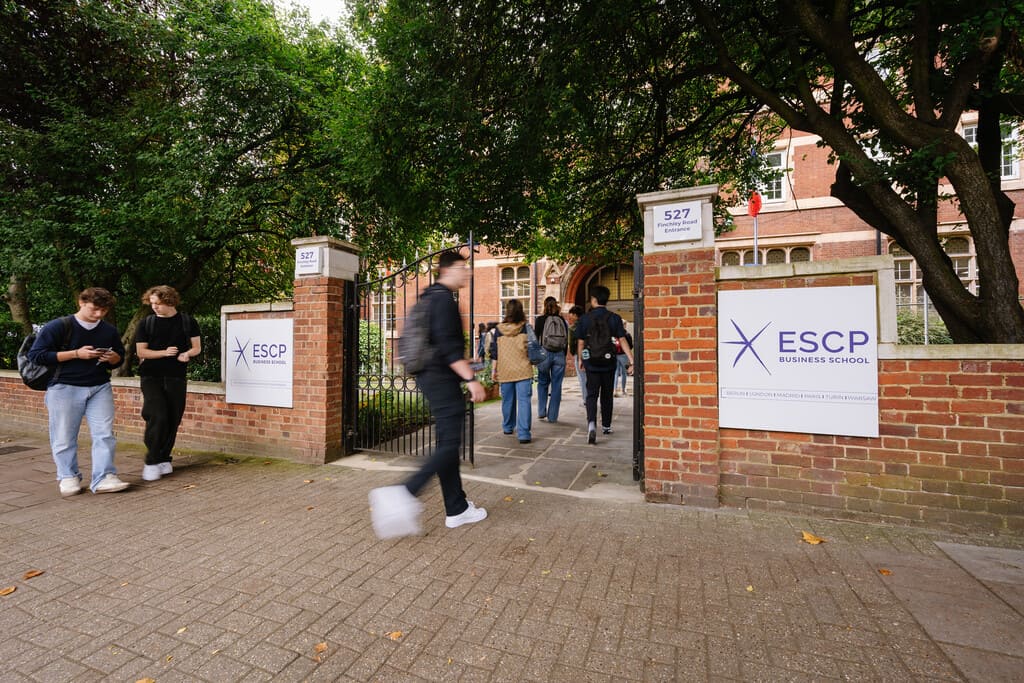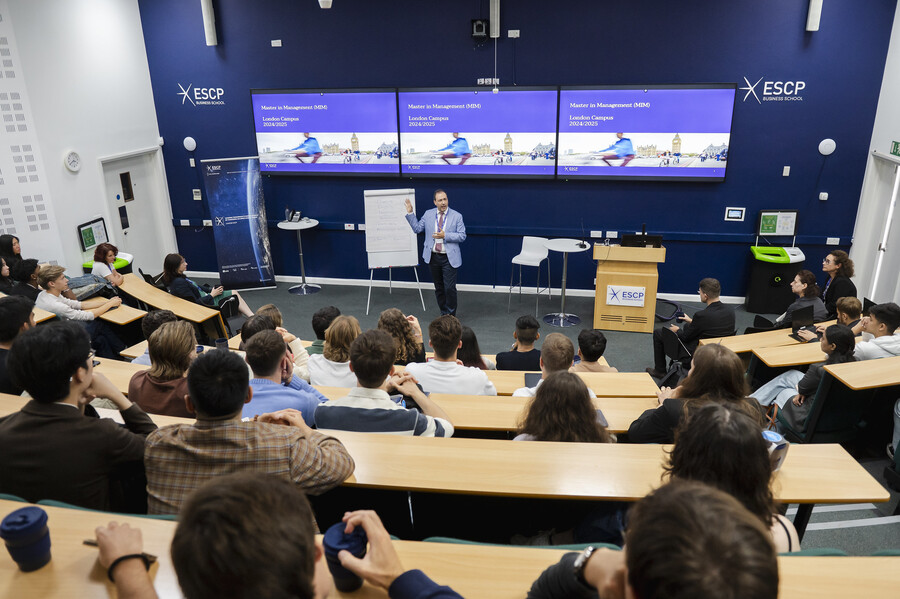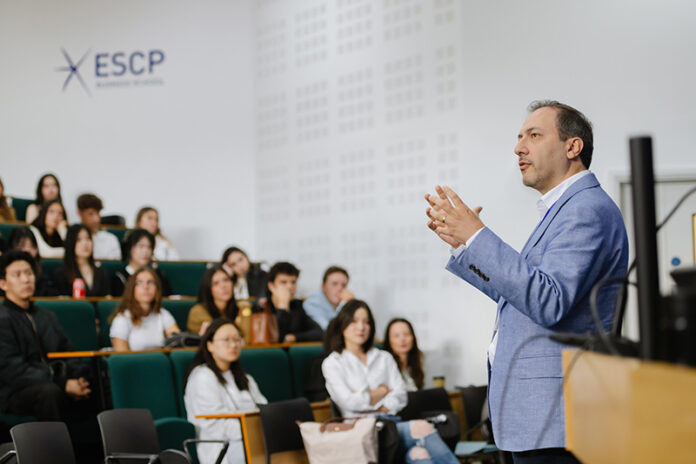Interview with Kamran Razmdoost of ESCP Business School, London Campus
In this insightful interview with Dean Kamran Razmdoost, Dean of ESCP Business School‘s London Campus, we delve into the dynamic evolution of one of Europe’s leading business schools. From substantial growth in student numbers and global recognition to groundbreaking sustainability efforts, Dean Razmdoost shares the initiatives shaping the school’s future. He also reflects on the unique position of the London Campus within ESCP’s multi-campus framework, the importance of inclusive leadership, and the vision for driving impactful change through business education.
Your journey with ESCP Business School began in 2017, and you became Dean of the London Campus in 2021. Can you share some key milestones or initiatives that have defined your leadership so far?
Overall, the past few years have been very successful but one of the key highlights for me has been the growth of the London Campus. We’ve had around 70% growth in just five years, from 700 students in 2019/20 to 1,200 in 2024/25 and, crucially, we have also managed to improve student satisfaction year-on-year during that period.
We have also consistently appeared in the top rankings for business schools, whether it’s through ESCP’s multi-campus programmes like the Master in Management, Master in Finance and Executive MBA, or programmes specific to the London campus like our MSc in Marketing & Creativity.
At the London Campus, our individual-centric approach places stakeholders, including students, employees, and partners, at the core of our services to enhance educational experiences and community alignment.
The most important milestone has been obtaining UK Degree Awarding Powers. All students through the London campus will get an additional UK degree upon graduation, allowing them to graduate with at least two internationally recognised degrees. This is an important step towards ESCP’s deeper integration within the UK’s academic and business ecosystem. Over the years, only a few international institutions have successfully obtained UK Degree Awarding Powers. We are proud to be one of the first European institutions to pass this threshold.
We have also reinforced our sustainability commitment by integrating sustainability modules and practical projects into all taught programmes. In London, collaborations with Climate Fresk, Climate Essentials, Better Futures+, Think and Do Camden, and Sulitest TASK, alongside in-depth training with AXA Climate School, ensure that 100% of students and staff can be trained on global environmental and social challenges.
The London Campus is one of ESCP’s six urban campuses across Europe. What makes the London Campus unique and what is its role in ESCP’s growing international presence?
Being embedded in the UK business and academic ecosystem is a big advantage for the London Campus. London, and indeed the UK, is strong across multiple industries that ESCP is trying to build and establish expertise in. From banking and investment to luxury and consultancy, London’s business sector provides an ideal platform for our students’ growth and academic development.
At the London Campus, our individual-centric approach places stakeholders, including students, employees, and partners, at the core of our services to enhance educational experiences and community alignment.
There is also a multidisciplinary element —our ambidextrous mindset — where we balance disciplines or ideas that haven’t traditionally gone together. You see it in our programmes like the MSc in Digital Transformation Management & Leadership, focused on advancing technology and human collaboration, and our MSc in Marketing & Creativity, which includes both analytics and creativity.
We have developed an agile culture focused on adaptability and innovation. We respond swiftly to changes, addressing complex challenges to find best solutions for stakeholders. This is specifically demonstrated in the fully customised executive education programmes we offer to clients.
At the same time, although we have our unique strengths, we are also lucky to receive many ideas and improvements from our sister campuses across Europe.

The “C-Suite Talk Series: The European Way” podcast that you host explores European values in leadership. What inspired you to start this series, and what key messages do you hope to convey through it?
Traditional leadership approaches don’t work as well as they used to. New generations require a different type of leader, someone who inspires and will work with them. They want to see themselves in their leader rather than simply following them.
So, with The European Way, we’ve been thinking about a more democratic and distributed leadership concept. We started this series to really explore that and what it means. We bring in leaders who are breaking boundaries in different ways, but the core message is that we want leaders who are not hierarchical but authentic, who inspire and who lead through collaboration.
In your podcast series, you emphasize a leadership approach that is collaborative, humble, and authentic. How do you see this approach influencing future business leaders, particularly in the European context?
There is a strong demand for this kind of leadership in the business marketplace. Humility is a priority for new generations of employees. They are not interested in hierarchy and want to build relationships with their leaders. It’s important that those leaders are humble and treat mistakes as a learning experience, that they open their leadership style so that everyone feels they have a voice.
People also require authenticity because they want to believe in what they do and associate meaning to it, and not just see work as something that is commanded on them. Another characteristic I would add to that list is mindfulness. At ESCP, we talk about inclusive leadership a lot. We define this as making sure that you are addressing everyone at the same level in every situation, that you are managing your biases and are aware of them. That requires a strong level of mindfulness.
You are a passionate advocate of inclusive leadership practices. Can you tell us about how you incorporate these practices into teaching at ESCP and what impact do you hope this will have on your students and beyond?
Educating students on inclusive leadership is difficult because it’s not only about knowledge. The knowledge part is easy thanks to our amazing professors. Our teaching is strong in this area, and we are creating a new institute on inclusive leadership to solidify our position as a leading advocate of these practices.

Beyond knowledge, inclusive leadership is about mindset. To achieve that mindset, students need to practice it daily. At ESCP, we have created a platform for students to do that. Whether they are working together, interacting with professors, applying for jobs, or chairing meetings, we encourage them to treat every situation as an opportunity to practice inclusive leadership.
This is a key part of their education and prepares them for difficult situations in future in which they probably won’t have time to experiment. The role of business schools is to create more opportunities for students to practice what they learn about inclusivity and other aspects of leadership so that they are confident applying them in the business world.
ESCP Business School is renowned as the world’s first business school, with a rich history dating back to 1819. How does the legacy of ESCP influence the school’s approach to modern business education?
Although it’s been more than 200 years since the School was established by a group of entrepreneurs, that entrepreneurial mindset is still a key pillar of education here. You can see the legacy directly in the Jean-Baptiste Say Institute (named after our Founder), dedicated to teaching about entrepreneurship, as well as in Blue Factory, our start-up incubator and accelerator across all our campuses.
Most importantly, ESCP was founded by practitioners who wanted to connect business education to what was going on in the world in practice. That is why a highly practical approach has always been a core part of our education. We build strong relationships with corporates and companies, and all our taught programmes have integrated internships, company projects and consultancy elements. This practical approach, beyond just MBAs where you would expect this, makes the ESCP experience truly unique.
ESCP Business School enables its students to have a truly international education across multiple campuses. Why is this such an important part of an education at ESCP and what are the benefits a multi-campus experience brings to your students?
A key advantage of ESCP being a multi-campus school is that our students are exposed to multiple cultures. All our students study in at least two and up to four different countries during their degree, spending at least a semester at each location. This allows them to fully immerse into a new culture, while gaining practical experience and a nuanced understanding of how different cultures influence business operations. It encourages them to question any assumptions and biases that they may have and break down those mental boundaries.
A key advantage of ESCP being a multi-campus school is that our students are exposed to multiple cultures. All our students study in at least two and up to four different countries during their degree, spending at least a semester at each location.
It also means our students have a more global perspective on economic, social, ecological, and technological transformations and can easily work in a multicultural environment with people from different backgrounds. This sort of open-mindedness, adaptability and multicultural insight into business practices and industry trends gives them a considerable advantage when joining global companies.
Students benefit from the wide range of expertise they are exposed to at our campuses, each with its own unique specialisations, faculty members and business ecosystems. They also benefit from our European Careers Centre, which provides students with extended access to services in the UK, France, Italy, Spain, and Germany, regardless of their teaching campus.
The London campus has seen significant growth, from 700 students in 2019 to 1,200 in 2024. What factors do you attribute to this rapid expansion, and what are your plans for the campus?
We are very proud of the growth of the London Campus, which aligns with the overall ESCP growth. This comes down to a range of factors, including our business model strength, reputation, and the success of our students and alumni.
Another engine of growth is our commitment to innovate and our unique programmes. For example, our BSc programme, where students study and live in a different country every year, attracts talent from across the globe. It’s a new way of studying that is particularly appealing to students wanting to challenge themselves. Our forward-thinking approach also draws in a wide range of faculty, enabling us to offer even more innovative programmes not only in terms of BScs and MScs, but Executive Education and Custom programmes too.
Our business model at both the Federal and local levels is strong and ensures that our campuses are defined by cutting-edge facilities. ESCP plans to expand and continue to grow over the next five years. In London, our goal is to reach 1,500 students by 2030. This growth will be fuelled by a combination of both planned portfolio diversification and the natural demand and growth of existing programmes.
ESCP Business School consistently ranks highly in global rankings. What do you believe sets ESCP apart from other top business schools, particularly in terms of its academic offerings?
Multiple things set us apart. Partly, it’s down to the factors I mentioned earlier like the success of our alumni, our commitment to innovation, practical approach, the benefits of student mobility, and our high-quality business education offering, but another key factor is the diversity of ESCP Business School as a whole.
Our student body is very diverse in terms of gender, nationality, even socio-economic background. In London, for example, we don’t have a dominant nationality on campus across students or staff. We also have one of the most diverse faculties in the world, which is valued by ranking organisations.
As ESCP continues to lead in business education, how do you see the school evolving over the next decade, particularly in response to emerging trends in management and leadership?
We are committed to being a business school that helps society tackle big issues. Whether it’s around geopolitics, economic inequality, rapid technological advancements, sustainability or social impact, we actively try to consolidate our research and maximise impact across our campuses to help address these unprecedented challenges.
At the London Campus, this commitment already translates to social impact and community engagement. We have launched a scholarship initiative for our Bachelor in Management programme to support Camden-based students who demonstrate both merit and financial need, and will continue collaborating with local organisations such as One Kilburn and Camden Council, to enhance our local impact and share our expertise.
Our faculty has seen a significant increase in impact-related research activities. Driven by ESCP’s €5m investment in five accelerators for impact research in Inclusive Leadership, Innovation & Entrepreneurship, Geopolitics & Business, Technology, and Sustainability, our focus for the decade ahead is to navigate these turbulent times and build a more sustainable and resilient future, inspiring positive change in Europe and beyond.
Executive Profile









